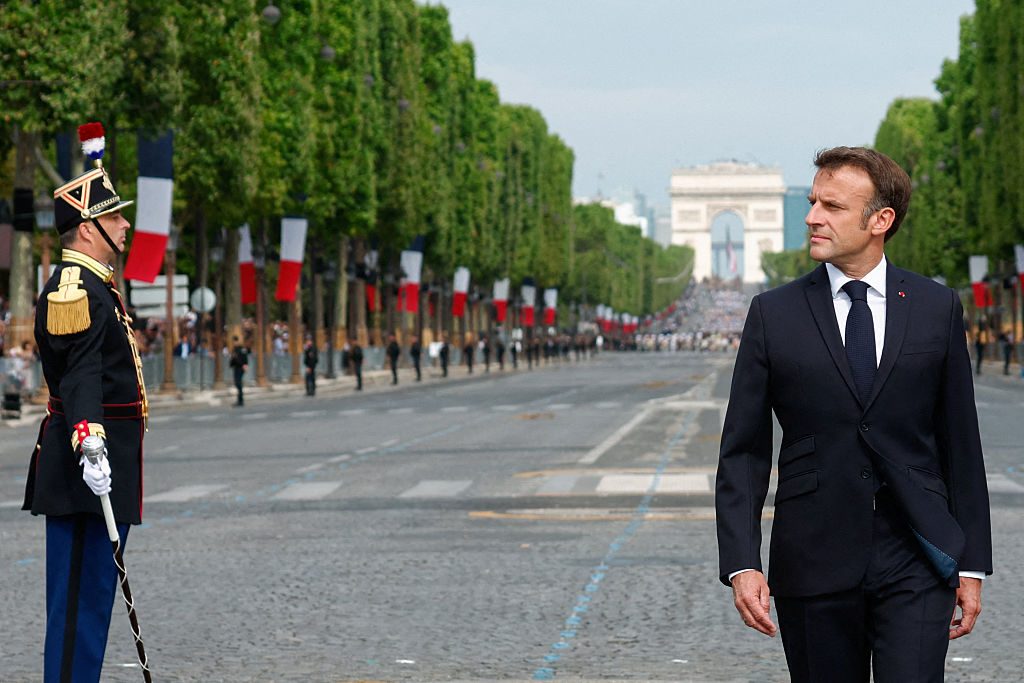Bastille Day usually makes international headlines for its fantastically choreographed military parade. This year, however, it also provided President Emmanuel Macron with the opportunity to announce a serious policy shift. To keep France “free” in a world of predators, his government is going to spend an extra €10 billion on defence over the next two years, starting with an extra €3.5 billion next year.
It’s been a long time coming. Macron had already hinted he wanted to increase military spending earlier this year, and from the start of his first term in 2017 to the end of his second term in 2027 he will have doubled France’s defence spending to €64 billion.
In a sense, Macron’s measures allow him to put his money where his mouth is. Despite having the most operationally effectice force in Western Europe, France’s defence budget has been lagging behind those of Germany and the UK. The country’s major fiscal problems make it difficult to see how it could fulfil a leadership role in maintaining Europe’s defence. To the President’s credit, a lesser politician would have been happy planning increased expenditure for their successors to deal with.
Macron’s speech was followed up on Tuesday by his Prime Minister François Bayrou announcing a €44 billion budget squeeze. The tone was equally sombre, with the PM warning that France could become the next Greece if major cuts aren’t made. As a share of GDP, France has the EU’s highest rate of taxes and social contributions (45.6% of GDP in 2023) and the highest government expenditure (57% in 2023). French debt is at 113% of GDP, only behind Italy and Greece, and was projected to increase to 118.1% in 2027 before Bayrou’s speech. The stakes are high. The IMF has this week been encouraging France to make cuts, especially in its administration and social security. Rating agencies have been keeping close tabs, too.
Not only did Bayrou announce tax increases and spending cuts, but he also floated the idea of axing two public holidays: 8 May and Easter Monday. He didn’t stop there: he fleshed out a “solidarity contribution” from the highest earners and cut state aid schemes for French companies. He announced a “blank year” for public spending, with a freeze on public salaries and benefits (the latter are usually adjusted for inflation). France’s health budget will also need to find €5 billion in savings. It did not take long for opponents of the French government at home and abroad to connect the dots between the two speeches, and accuse Macron of paying for guns by cutting butter.
Truthfully, though, France’s fiscal woes have little to do with defence spending. In 2024, only €31 of every €1000 of public spending went towards the military. That’s a fraction of what the country spends on healthcare (€201) or pensions (€251). France spends over a billion euros a day on pensions. In other words, Macron’s defence budget hike in 2026 could be covered by just three days of pension spending. In fact, pensions have generated half of the debt increase since his election in 2017.
Even still, this may not matter in a few weeks. Macron still lacks a majority in parliament and could see his government deposed at any moment. Last year’s much less ambitious budget caused the collapse of Michel Barnier’s government. His successor Bayrou will somehow have to convince some opposition MPs to help him pass one of the most toxic budgets in recent history. If no progress can be made, Macron may have no other option but to spook financial markets and dissolve parliament.
